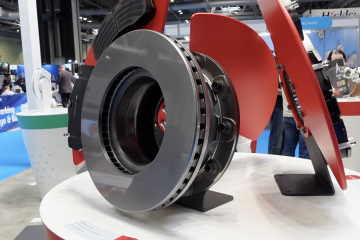A new campaign has been launched by the government to warn of the dangers of purchasing counterfeit parts.
The ‘Fake Always Breaks’ campaign is backed by the Intellectual Property Office (IPO) and comes after Organisation for Economic Co-operation and Development (OECD) research estimated that counterfeit vehicle parts imported to the UK were worth almost £1billion in 2016.
The campaign aims to drive home a clear message that alerts drivers to the dangers of counterfeit parts. These can include items such as brakes, headlights and air bags.
A survey conducted for the IPO has revealed that one in six motorists who responded said they had bought a counterfeit part in the past 12 months alone.
Fake Always Breaks
The Fake Always Breaks campaign highlights how counterfeit vehicle parts are not subject to the same rigorous testing as legitimate products. It highlights new guidance advice for consumers and the motoring industry published by the IPO on how to spot and report a fake, developed in partnership with the industry itself.
The campaign is being supported by a range of organisations in the automotive industry and vehicle repair and servicing sectors. These include the Independent Automotive Aftermarket Federation and the Independent Garage Association.
Vehicle manufacturers including Mercedes Benz, and law enforcement bodies such as the City of London Police’s Intellectual Property Crime Unit (PIPCU), are also involved in the campaign.
Fake Always Breaks brings targeted social media and industry voices together to deliver an awareness message that it hopes will resonate, and help consumers make informed choices, either by avoiding counterfeit parts or by ensuring they use reliable aftermarket sources.
The campaign shows that many of the most commonly-purchased counterfeit parts in the UK pose significant safety concerns if faulty. These include car batteries (bought by 25% of motorists who admit to buying counterfeit parts), tyres/wheels (23%) and windscreen wipers (19%). Another 14% of motorists who have purchased fake car parts bought counterfeit airbags, while 12% bought fake brake pads or discs.
Price factor for counterfeit parts
Although many purchases are made unknowingly, almost three fifths (58%) of motorists responding to a survey said they did so knowing the part was counterfeit.
The survey also found that getting parts for a lower price was a significant factor among those intentionally buying a fake part, with 31% citing cost savings as a reason.
Of those responding, 34% who admitted to buying fake parts said they did so because they felt there was no discernible difference in appearance (34%).
Responses also suggest that such purchases made unknowingly are often uncovered at a later stage. A total of 45% who bought a counterfeit part that they thought was genuine, found out through their garage after the part failed. Another 30% bacame aware during routine service checks.
Industry backing
“We are pleased to support the IPO’s campaign that aims to raise awareness of the severe safety risks that counterfeit parts pose to all road users,” commented Stuart James, Chief Executive Officer at the IGA.
“Garages should ensure that they avoid using customer supplied parts and fit parts from trusted suppliers and reputable vehicle parts distributors. This practice not only enhances the safety of vehicles but also reassures customers that all components meet the required specifications.
“We actively encourage any garage that identifies counterfeit parts to report them through the various channels highlighted in the IPO advice. Together, we can combat this issue and contribute to safer roads for all.”
Miles Rees, IPO Deputy Director of Enforcement, added: “This is a serious campaign with a very serious message. We want to raise awareness that the trade in counterfeit vehicle parts not only harms legitimate traders while enriching criminals, but can also lead to life-changing or life-ending consequences for road users.
“Working with our partners, we are highlighting that such illicit goods are not subject to safety tests, and are likely to be made using vastly inferior materials. This puts them at increased risk of failure, with potentially devastating results.
“Our ‘Fake Always Breaks’ campaign seeks to arm motorists and the vehicle repair and servicing industries with the awareness they need to help spot a fake, avoid the risks and report sellers. It reinforces a clear message that – as with all counterfeiting and piracy – this is anything but a victimless crime.”



